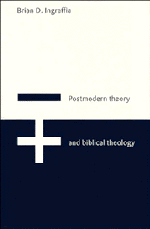Book contents
- Frontmatter
- Contents
- Acknowledgements
- List of abbreviations
- Note on translations of the Bible
- Introduction: postmodernism, ontotheology, and Christianity
- 1 NIETZSCHE'S MOCKERY: THE REJECTION OF TRANSCENDENCE
- 1 The death of God: loss of belief in the Christian God as the cause of nihilism
- 2 Vanquishing God's realm: Nietzsche's abolition of the true world
- 3 Nietzsche on the Judaeo-Christian denial of the world
- 4 The redemptive–eschatological separation between the present world and the world to come in the New Testament
- 5 On redemption: the eternal return or biblical eschatology
- II HEIDEGGER'S FORGETTING: THE SECULARIZATION OF BIBLICAL ANTHROPOLOGY
- III DERRIDA'S DENIALS: THE DECONSTRUCTION OF ONTOTHEOLOGY
- Conclusion: ontotheology, negative theology, and the theology of the cross
- Notes
- Bibliography
- Index
2 - Vanquishing God's realm: Nietzsche's abolition of the true world
Published online by Cambridge University Press: 01 June 2011
- Frontmatter
- Contents
- Acknowledgements
- List of abbreviations
- Note on translations of the Bible
- Introduction: postmodernism, ontotheology, and Christianity
- 1 NIETZSCHE'S MOCKERY: THE REJECTION OF TRANSCENDENCE
- 1 The death of God: loss of belief in the Christian God as the cause of nihilism
- 2 Vanquishing God's realm: Nietzsche's abolition of the true world
- 3 Nietzsche on the Judaeo-Christian denial of the world
- 4 The redemptive–eschatological separation between the present world and the world to come in the New Testament
- 5 On redemption: the eternal return or biblical eschatology
- II HEIDEGGER'S FORGETTING: THE SECULARIZATION OF BIBLICAL ANTHROPOLOGY
- III DERRIDA'S DENIALS: THE DECONSTRUCTION OF ONTOTHEOLOGY
- Conclusion: ontotheology, negative theology, and the theology of the cross
- Notes
- Bibliography
- Index
Summary
One has deprived reality of its value to the extent to which one has mendaciously invented an ideal world.
The “true world” and the “apparent world” – that means: the mendaciously invented world and reality.
Nietzsche, Ecce HomoWe have seen how according to Nietzsche the loss of Christian faith is the source and ground of modern nihilism. But how is this Christian faith, which prevented the outbreak of nihilism by giving a meaning and a purpose to the earth and man, at the same time nihilistic in itself?
Nietzsche answers by asserting that the ideals and values posited by the Christian-moral interpretation of the world are fictitious. Although these values served to prevent radical nihilism while they were believed in, now that this belief has been revealed to be illusory, radical nihilism comes upon us. “Now that the shabby origin of these values is becoming clear, the universe seems to have lost value, seems ‘meaningless’ – but that is only a transitional stage” (WP 7). This transitional stage of nihilism, this negative interpretation of the loss of religiously based values as the loss of all meaning, purpose, and direction, is necessary in order to overcome the false values by which man has directed his life and society thus far.
For why has the advent of nihilism become necessary? Because the values we have had hitherto thus draw their final consequence; because nihilism represents the ultimate logical conclusion of our great values and ideals – because we must experience nihilism before we can find out what value these “values” really had.
(WP “Preface”)- Type
- Chapter
- Information
- Postmodern Theory and Biblical TheologyVanquishing God's Shadow, pp. 33 - 45Publisher: Cambridge University PressPrint publication year: 1995



